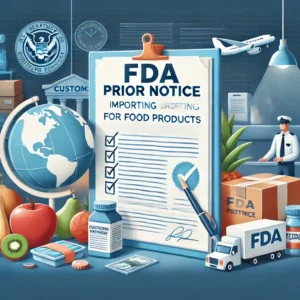
The prior notice requirement by the FDA is a crucial aspect for anyone involved in importing food products into the United States. It mandates that importers submit specific information about their shipments before arrival at the U.S. border. This regulation ensures that the FDA can assess risks and protect public health by preventing potentially unsafe food items from entering the market.
Understanding the details of prior notice FDAcan save businesses time and money, as non-compliance may lead to shipments being delayed or rejected. Importers must familiarize themselves with the required data elements and the submission process to ensure smooth transactions. Awareness of these necessities is vital for effective supply chain management.
The implications of prior notice extend beyond regulatory compliance; they impact customer trust and product availability. By staying informed about the latest updates and guidelines, businesses can maintain their reputation and ensure that consumers receive safe and quality products.
Overview of FDA’s Prior Notice System
The FDA’s Prior Notice System is crucial for ensuring food safety in the United States. It establishes protocols for importation, focusing on the identification and prevention of potential public health risks.
Legal Framework and Background
The FDA’s Prior Notice System operates under the Bioterrorism Act of 2002. This legislation mandates that the FDA receives advance notice of food imports before they arrive at U.S. borders. Importers must submit Prior Notice information electronically through the FDA’s Prior Notice System Interface.
This system allows the FDA to review the details of incoming shipments, including source, quantity, and destination. It aims to protect consumers by facilitating rapid response to potential hazards. Non-compliance can lead to shipment delays or rejections at the border.
Purpose and Public Health Importance
The primary purpose of the Prior Notice System is to safeguard public health through early detection and prevention of unsafe food products. By requiring advance notice, the FDA can efficiently assess risks linked to food imports and initiate timely investigations if necessary.
Public health importance is underscored by recent global trends in foodborne illnesses and outbreaks. The system is integral for enhancing traceability and coordination among federal agencies. Effective implementation contributes to overall food safety, reassuring consumers of the integrity of imported goods.
Compliance and Enforcement
Ensuring adherence to prior notice requirements is crucial for businesses involved in importing food products into the United States. Compliance not only affects market access but also carries significant implications for firms that fail to meet FDA standards.
Submission Requirements
Entities must submit prior notice to the FDA before importing food into the U.S. This submission must include details such as the product name, manufacturer, and country of origin. It can be filed electronically through the FDA’s Prior Notice System Interface (PNSI).
Time-sensitive requirements exist: submissions must occur at least 2 hours but no more than 5 days before arrival. Any amendments or updates to the submitted notice need prompt reporting. Failure to adhere to these requirements can result in enforcement actions.
Consequences of Non-Compliance
Non-compliance with prior notice regulations can lead to serious consequences. This includes the potential rejection of shipments at the border, which can result in financial losses and disruption of supply chains.
More severe penalties may include monetary fines or other legal actions against companies that repeatedly fail to comply. The FDA has the authority to conduct inspections to confirm compliance and can seize products deemed non-compliant. Therefore, businesses must be diligent in meeting all FDA requirements to avoid these repercussions.
Vaishno Devi Helicopter Ticket Price: A Comprehensive Guide for Pilgrims
Vaishno Devi is one of the most revered pilgrimage sites in India, attracting millions of …